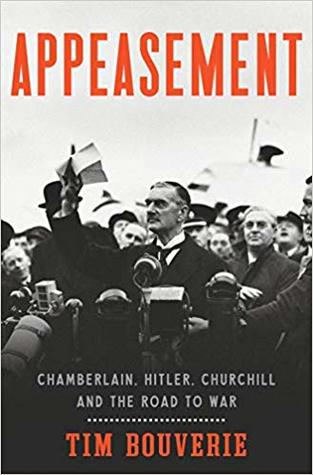
Appeasement
Chamberlain, Hitler, Churchill, and the Road to War
کتاب های مرتبط
- اطلاعات
- نقد و بررسی
- دیدگاه کاربران
نقد و بررسی

Starred review from May 15, 2019
Illuminating study of the complex political calculus underlying Britain's effort to avoid armed conflict with Nazi Germany in the late 1930s. Most of the conservative leadership in Britain was aware from the start, if only dimly, that Hitler and his Nazis posed an existential threat to world order. Yet, after the bloodletting of World War I, writes Bouverie in this accomplished debut, there was no appetite for war, so that "the idea of a 'preventive war' to halt German rearmament was...beyond the realm even of discussion." Even though most members of the political class found official Nazi anti-Semitism appalling, "there was a tendency amongst some to find excuses for it." As a result, Britain stood by, acceding to German demands up to and including the annexation of a portion of Czechoslovakia with a large ethnic German population. As the author notes, that act of aggression was greeted enthusiastically by some Sudeten Germans but certainly not by the leftists, Jews, and members of other ethnic minorities who lived there. Hitler promised Britain's prime minister that if his government met Germany's " 'limited' colonial demands," there would be no further friction, but then came the invasion of Poland and the outbreak of World War II. Examining a trove of unexplored documents, Bouverie turns a gimlet eye on excuses proffered in the aftermath, such as the thought that the year of peace bought by the appeasement of 1938 gave Britain time to prepare for war; as he notes, it also bought Germany an extra year to build up its forces against the numerically superior French and British armies. The author faults Chamberlain, too, for having "treated the United States with frigid disdain" when a stronger alliance might have averted some of Hitler's mischief, though he does not doubt the purity of Chamberlain's intentions to preserve the British Empire and keep the peace. A story with many moving parts and players that's expertly told, one that sheds new light on the first glimmerings of total war.
COPYRIGHT(2019) Kirkus Reviews, ALL RIGHTS RESERVED.

June 1, 2019
Could Hitler have been halted before rampaging Europe? Why did England believe they could manage the Third Reich without military force? These are questions Bouverie (Appeasing Hitler) answers thoroughly and decisively in this latest work. Appeasement, per the book's title, was a notion that Germany in the 1930s could simply be controlled. Bouverie meticulously details the rise and aggression of Hitler through the lens of British politicians, diplomats, and powerbrokers. The author argues that some foresaw Hitler for the despot he was, but many, most notably British prime minister Neville Chamberlain, could not fathom that Hitler's motives were so malevolent and cruel. Readers get a full view of this extensive failure from backroom dealings to the floor of parliament. Many know of how Chamberlain's successor, Winston Churchill, rose to glory in helping to defeat Hitler. Bouverie's history looks at individuals shying away from making difficult decisions in order to see what was right in front of them, with the goal of pinpointing the reasons why England waited so long to act. VERDICT History readers, particularly of the 20th century, will appreciate Bouverie's relentless pursuit of answers to the question, "Why?"--Keith Klang, Port Washington P.L., NY
Copyright 2019 Library Journal, LLC Used with permission.

August 19, 2019
In this meticulous work, British journalist Bouverie provides a blow-by-blow recounting of Britain’s accommodation to Nazi Germany’s rearmament, beginning with the obvious observation that “the desire to avoid a second world war was perhaps the most understandable and universal wish in human history.” He convincingly argues that the failure of strong, consistent diplomatic efforts greatly contributed to the century’s great conflagration. Many British establishment figures of the time come in for fair and sometimes harsh criticism as Bouverie charts the descent toward war. Conservative Prime Minister Stanley Baldwin, Foreign Secretary John Simon, and, of course, Prime Minister Neville Chamberlain, architect of the 1938 Munich agreement that caved to Hitler’s expansionism because it promised “peace for our time,” receive deserved criticism. So do the many upper-class, right-leaning “amateur diplomats” who tried to build relations with Hitler. According to Bouverie, they wanted to believe that Hitler’s objectives were modest and feared that rearmament was unaffordable and would escalate tensions. Bouverie manages to convey how outside the mainstream Churchill’s anti-Hitler views were for much of the mid-1930s, and how dimly his WWI record was viewed by his foes in the Conservative Party. His reconstruction is both clear-eyed and well-paced. This intelligent study of British prewar diplomacy will keep readers rapt.

























دیدگاه کاربران